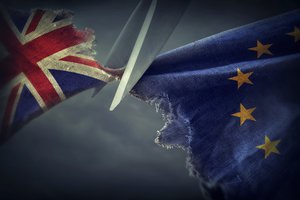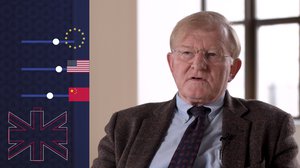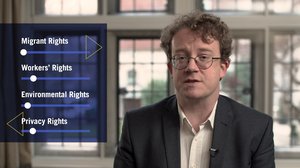Complexity’s Embrace: The International Law Implications of Brexit looks into the deep currents of legal and governance change that will result from the United Kingdom’s departure from the European Union. The editors of Complexity’s Embrace discuss what Brexit means for international and domestic laws and regulations that shape daily life and suggest possible ways forward.
[OONAGH FITZGERALD]
As international lawyers, we were very interested in thinking about how does one unmake international obligations that have been built up over a period of decades?
[EVA LEIN]
And it’s quite complicated to actually get out of all those legal rules that bind the UK at the moment, but at the same time, to sort of replace them with something new.
[OONAGH FITZGERALD]
So, never in our experience had we had this kind of a complex breakdown of a relationship and a desire to disentangle. So, this was the genesis of writing the book, and we started looking at the number of issues that arose.
[EVA LEIN]
So, we’ve decided to deal with a variety of different topics on which Brexit has deeper implications, and especially to bring them together in one collection because that hasn’t really been done yet. So, we tried to look at various topics, ranging from trade to financial services to intellectual property, environmental questions and also human rights.
[OONAGH FITZGERALD]
And in each case, we’re examining the international law implications of this move to disentangle the United Kingdom from European Union law. So, we thought it would be really useful to get different perspectives, so in this book, we have authors who are from the United Kingdom, from the European Union and from North America.
[EVA LEIN]
And, the authors of the book have tried to show: What are the rules that come from EU law at the moment? What benefits do those rules bring for the UK? And what would actually happen if those rules are no longer there?
[OONAGH FITZGERALD]
And I think we’ve done the work in this book to pull together a really good collection of insights into the international law implications of Brexit that will be useful to any country around the world trying to rethink its relationship with the UK.
[EVA LEIN]
Reading this book and reading about all the issues across all those sectors gives you a very deep understanding of the different problems that there are because not all of the issues that are mentioned in the book have been really prominent in the public discussion so far.
[OONAGH FITZGERALD]
The solutions all require compromise, so when people say, “Brexit means Brexit,” “We’ll just leave — that’s the way we do it,” people need to understand what the consequences are of that.
[EVA LEIN]
So, if you want to go beyond the rhetoric of “Brexit means Brexit” and “no agreement is better than a bad agreement,” I really encourage you to read this book because it gives you great indications on what is feasible, what is possible. It’s a great read, it’s very interesting and it’s very detailed, so you will get all sorts of information about the consequences of Brexit and the potential way forward.
For media inquiries, usage rights or other questions please contact CIGI.
The opinions expressed in this article/multimedia are those of the author(s) and do not necessarily reflect the views of CIGI or its Board of Directors.


